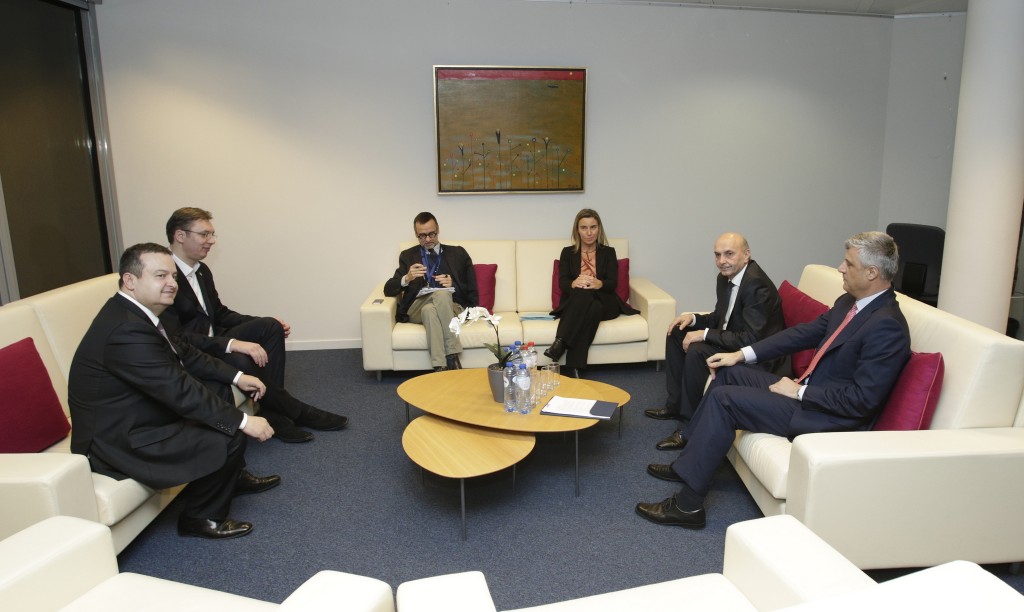

There are no secret agreements between Kosovo and Serbia, says top EU official for Western Balkans.
There is no secret agreement between Kosovo and Serbia to shut down Serbian municipal structures in Kosovo, the Director for Western Europe, the Western Balkans and Turkey, European External Action Service (EEAS), Angelina Eichhorst confirmed to Prishtina Insight in an interview.
Kosovo Minister for Dialogue Edita Tahiri frequently says that before the planned Association/Community of Serb-majority municipalities is established, Serbia will shut down down the remnants of its governance structures which still operate in Prishtina. However, this is not a component of any agreement signed in Brussels between Belgrade and Prishtina, and Eichhorst said that the EU has not facilitated any agreement that has not been made public.
“The EU does not do ‘secret agreements’,” said Eichhorst, when asked to address the prevalent rumour that such a document exists. “And as for Kosovo and Serbia, I do not see both parties in the dialogue with a hidden agenda. This is nonsense.” She added that the April 19, 2013 ‘First Agreement on Principles’ “was concluded in full respect of Kosovo law; municipalities in Kosovo should function in accordance with the Kosovo laws.” However, she did not make any remarks about the Serbian municipal structures which continue to function in Kosovo.
Eichhorst also said that the December 23, 2015 Constitutional Court decision, which said that some elements of the EU-brokered deal on the formation of the Association/Community of Serb-majority municipalities unconstitutional, maintained that the body must be formed. She called on Kosovo’s politicians to explain this to the people.
“Through its judgment, the Court provides guidance to be observed when the Statute for the Association/Community is drafted,” she said. “It is important that this is well understood and well explained.”
There was little debate in the months after the deal was signed, but the verdict of the Constitutional Court contributed to the tens of thousands of people joining opposition-sponsored protests against the deal with Serbia.
“There has now been more debate, although the full and correct legal picture risks to be overshadowed by negativity from those who say they oppose the Association/Community on principled grounds, regardless of the political and legal reality.”
However, said Eichhorst, the sometimes violent reactions in the public sphere are damaging to Kosovo, calling for an inclusive dialogue inside the institutions.
“The opposition has an important role to play to hold government to account,” she said.
However, “Violence is a red line in any shape and form. It is unacceptable. If political points can only be scored through violence then you end up in anarchy. Political differences should be resolved through dialogue, in the institutions that have been set up to provide an open and transparent debate and decision-making process, that guarantees inclusiveness but also accountability.”

According to Eichhorst, before the agreements were signed, there was wide consultation with the relevant parties, which seems to her to be forgotten.
“Leading up to both Agreements, representatives from different political parties – even though the work should not be done based on party politics – were involved in the entire process. To then go out and protest after the Agreements raises a number of questions. I hope that now the important work on the Statute can start and that steps are taken to move forward – not backward. For the sake of Kosovo and the people of Kosovo.”
When asked about the agreement on integrating the judicial personnel from the four northern municipalities who had been working in the Serbian system into the Kosovo system, Eichhorst said that transparency is an important element. When asked about the justice agreement and why it has been published only by Kosovo as a leaked document, she said:
“It is the responsibility of the parties to publish the full text of the agreement and your question is a good reminder of the fact that communication is of essence,” she said.
Eichhorst also responded to concerns that the leaked version does not mention the integration of non-Serb minorities by saying, “the integration of judicial personnel currently employed by Serbia will include other minority representatives as well, Bosniaks in particular.” She did not, however, elaborate on how this would come to pass.
As both sides eye the opening of new issues — Kosovo is keen to discuss the issue of missing persons while Serbia wants to open negotiations about religious and cultural heritage — Eichhorst said that all parties to the negotiations will not lose sight of implementing the existing agreements.
“There are incremental implementation steps on a daily basis,” she said.
Eichhorst is adamant that hard work is necessary to improve the situation in Kosovo, especially in northern Kosovo.
“Nothing is easy these days, not in the Balkans, not in Europe, not anywhere. But when two entities have opted for the European path, when both have agreed to work out their differences, then difficult decisions have to be made, agreed and implemented. It is about political will. It is about turning CAN’Ts into CANs, dreams into plans. Yes, the situation in the North is very complex, very difficult. There are legitimate fears, worries, concerns amongst the people. These have to be addressed, explained, dealt with. By doing nothing, by not addressing the issue, one cannot move forward.”
This article was updated to add another quotation about the 19 April 2013 agreement being in full compliance with Kosovo law, to provide more context about the agreements, and to add hyperlinks to the texts of agreements and reports on their implementation. The headline was updated to reflect that fact that Ms. Eichhorst confirmed that there are no secret agreements.
17 March 2016 - 14:15

Serbia has not explained why Dejan Jankovic was arrested on Wednesday,...

Kosovo advises its citizens to avoid traveling through Serbia “at al...

The Council of Europe's parliamentary assembly recommendation of Kosov...

Ahead of the 25th anniversary of the end of hostilities in Kosovo, the...